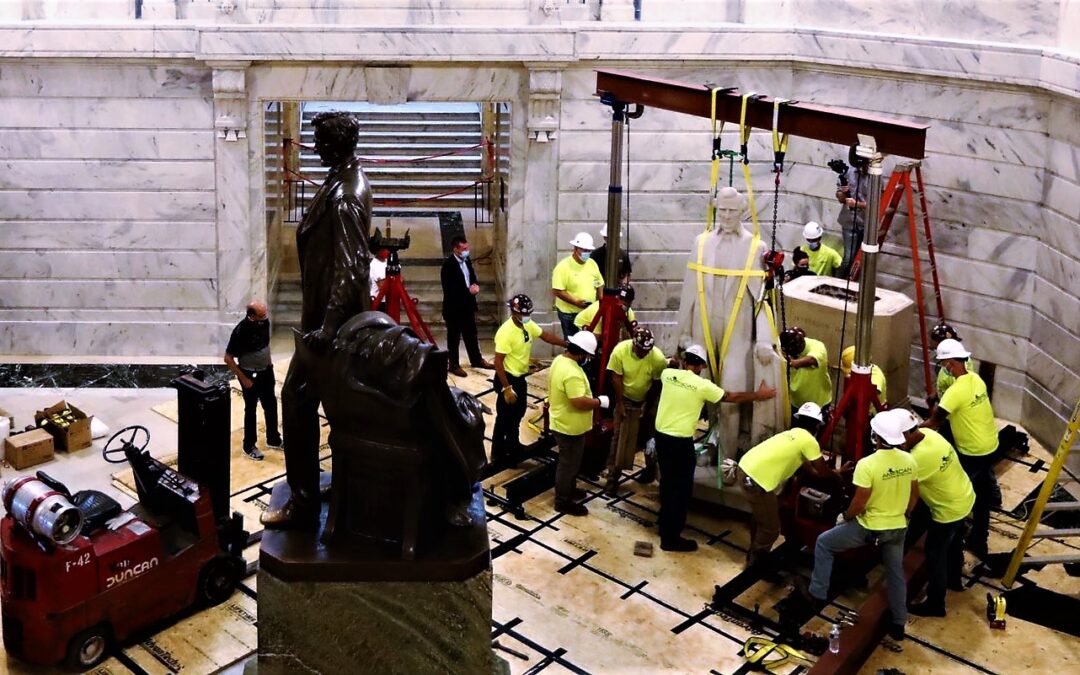The South has lost again.
Jefferson Davis and his legacy departed Kentucky’s Capitol rotunda after a 12-foot marble statue commemorating the lone president of the Confederate States of America was removed from its base Saturday morning.
Workers assembled a rig that lifted the 5-ton marble sculpture off the pedestal where it stood for 84 years — just a few feet behind the bronze statue of fellow Kentuckian Abraham Lincoln.
Gov. Andy Beshear, who joined workers in the rotunda on Saturday, said the monument represented a divisive symbol in Kentucky.
“After calling for its removal and urging the Historic Properties Advisory Commission to act, today I pressed the button to bring it down,” Beshear tweeted. “Now, every child who walks into their Capitol feels welcome. Today we took a step forward for the betterment of every single Kentuckian.”
After calling for its removal and urging the Historic Properties Advisory Commission to act, today I pressed the button to bring it down. Now, every child who walks into their Capitol feels welcome. Today we took a step forward for the betterment of every single Kentuckian. ^AB pic.twitter.com/Aqar1iXgur
— Governor Andy Beshear (@GovAndyBeshear) June 13, 2020
Davis, a Fairview native, graduated from the U.S. Military Academy at West Point in 1828 before serving in the Mexican–American War. He later was a U.S. senator from Mississippi.
But he was also traitor to the country and an ardent racist who fiercely defended slavery and opposed civil rights for African Americans after the Confederacy was defeated.
“Today is a symbol we are moving ahead,” state Rep. Jason Nemes, R-Louisville, told The Courier Journal on Saturday. “It’s a recognition of the sins of our past.”
Nemes, a lawyer, brought his son to the Capitol to witness the statue’s removal. He said he was shocked when he first saw the statue in the rotunda during his bar association swearing-in ceremony years ago.
“We honor our history — the good and the bad — but in this room is what we want to celebrate,” Nemes said. “And I think it’s a wonderful thing that we don’t want to celebrate Jeff Davis anymore.”
Calls to remove Davis from the rotunda, where thousands of tourists visit each year, have been made for years by Republican and Democratic leaders in the state.
But demands that the statue be removed intensified in recent weeks, as large protests in Louisville and throughout Kentucky developed over the death of Breonna Taylor, an unarmed Black woman shot eight times in her home by Louisville police officers.
Those demonstrations over police brutality against African Americans proliferated around the country after the May 25 killing of George Floyd by a police officer in Minneapolis, with the movement adding the removal of Confederate monuments to its list of demands.
Protesters in Richmond, Virginia, this week toppled a Davis statue, which had stood along the city’s Monument Avenue since 1907.
Beshear, a Democrat, nudged the Historic Properties Advisory Commission to hold a special meeting, which it did on Friday. The panel voted to remove the Davis statue by an 11-1 vote.
The approved motion also called for moving the statue to the Jefferson Davis Monument State Historic Site in Todd County, where the Confederate leader was born.
Davis was placed in the rotunda at the urging of the United Daughters of the Confederacy in 1936.
Cathy Thomas, who was appointed to the historic properties panel by Beshear in January, argued for the removal of the Davis statue during Friday’s meeting.
She said it was placed in the rotunda during the Jim Crow era to reaffirm white supremacy, amid threats of lynchings and segregation that were prevalent at the time.
“He enslaved human beings, he rebelled against the United States of America,” Thomas, who is Black, told the commission. “He is a symbol of the Confederacy that might still have me in chains.”
Davis was a champion of expanding slavery into other territories such as when as a U.S. senator in 1848 he proposed an amendment seeking to annex a part of Mexico where many Southerners at the time wanted to expand slavery.
He also favored the U.S. seizing Cuba to “increase the number of slaveholding constituencies.”
Three years before the Civil War, he threatened secession if a Republican were elected president. And when Mississippi seceded from the Union in 1861, Davis resigned from the Senate in protest and delivered a farewell speech defending slavery.
“African slavery, as it exists in the United States, is a moral, a social and a political blessing,” Davis once said.
Davis was eventually captured after the Civil War and was charged with treason, but was later pardoned by President Andrew Johnson.
Years after the war had ended he refused to take the oath of allegiance that many former Confederate soldiers and officials had made to regain their citizenship.
Davis’s U.S. citizenship was restored posthumously by Congress in 1978.
